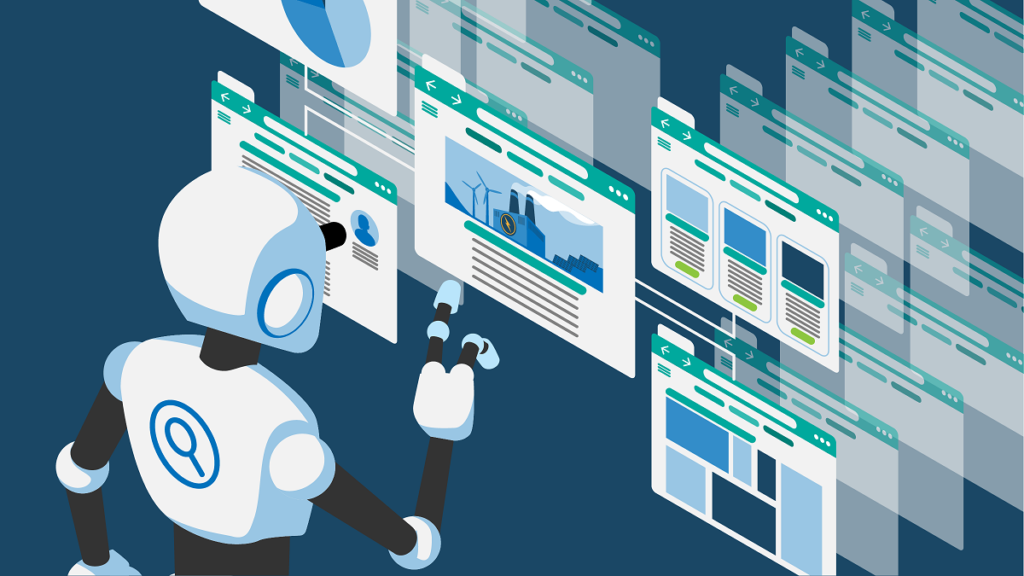As we examine SEO’s future, we face an unavoidable force: artificial intelligence. How AI is revolutionizing SEO is the question, not whether it will. The impact of AI on SEO will be covered in this post, along with how to adjust and balance it with human knowledge. AI will change search algorithms and improve content tactics. One of the best digital marketing tactics will continue to be SEO, and AI will help it become even more powerful.
By improving search result accuracy and customization, AI-powered algorithms—like Google’s RankBrain—have had a big influence on SEO, creating a more complicated yet lucrative SEO environment. To provide more relevant search results, these algorithms use machine learning to understand user intent, or the user’s main objective or purpose while searching.
Ways AI Shaping SEO

1. Enhanced Keyword Research and Analysis
AI-driven tools like SEMrush and Ahrefs provide unparalleled insights into keyword trends, search volume, and competition and answers to how AI is revolutionizing SEO. By leveraging machine learning, these tools analyze vast amounts of data to recommend high-impact keywords tailored to a website’s niche.
AI also identifies long-tail keywords and search intent more effectively, helping marketers create content that aligns with what users are genuinely searching for.
Example: Google’s BERT algorithm uses natural language processing to understand the context and nuances of search queries, improving keyword relevance and targeting.
2. Content Creation and Optimization
AI tools, such as ChatGPT and Jasper, are increasingly used to generate high-quality content. These platforms can draft blog posts, meta descriptions, and product descriptions while optimizing content for SEO.
AI also ensures that content is well-structured, incorporates relevant keywords, and meets readability standards. Tools like Clearscope and Surfer SEO analyze top-ranking pages to suggest improvements in content length, keyword density, and semantic relevance.
3. Voice Search Optimization
The rise of voice assistants like Alexa, Siri, and Google Assistant has made voice search optimization a priority and an answer to how AI is changing SEO. AI helps SEO professionals understand the conversational tone and natural language patterns of voice queries.
By analyzing how people speak versus how they type, AI ensures that content aligns with voice search trends, focusing on question-based queries and local search phrases.
4. Improved User Experience (UX)
User experience plays a significant role in SEO rankings. AI tools monitor metrics such as bounce rates, dwell time, and page load speed to identify areas for improvement.
For example, Google’s RankBrain uses machine learning to evaluate user satisfaction with search results. Websites offering a better UX, such as intuitive navigation and fast-loading pages, are rewarded with higher rankings.
5. Predictive Analytics and Trend Forecasting
One of the answers to how AI is revolutionizing SEO is that AI empowers marketers with predictive analytics, allowing them to anticipate changes in search trends. By analyzing historical data and user behavior, AI tools provide insights into upcoming keyword trends and content demands.
This proactive approach ensures that businesses can adapt their strategies to stay ahead of competitors. Tools like BrightEdge and MarketMuse excel in forecasting trends and identifying content gaps.
6. AI-Powered Competitor Analysis
Understanding the competition is crucial for SEO success. AI tools analyze competitor websites, tracking their rankings, keywords, backlinks, and content strategies.
Platforms like SpyFu and SimilarWeb use AI to identify strengths and weaknesses in competitors’ SEO efforts. This information helps businesses refine their strategies and seize untapped opportunities.
7. Automation of Routine SEO Tasks
AI streamlines time-consuming SEO tasks such as site audits, backlink analysis, and performance tracking. Automation allows marketers to focus on strategic decision-making instead of manual data collection and analysis.
Example: Screaming Frog and Botify use AI to automate crawling and indexing issues, generating actionable insights to optimize website performance.
8. Localized and Personalized SEO Strategies
To answer how AI is changing SEO, AI enables hyper-local and personalized SEO, targeting users based on their location, preferences, and search history. Tools like Moz Local and BrightLocal optimize local listings and identify location-specific keywords.
Personalization enhances user engagement by delivering tailored search results, increasing the likelihood of conversions. AI algorithms analyze user behavior to suggest personalized recommendations and offers.
The Future Of AI In SEO
To know how AI is revolutionizing SEO, the role of Artificial Intelligence (AI) in Search Engine Optimization (SEO) is expanding rapidly, setting the stage for a new era in digital marketing. As search engines become smarter and user expectations grow, AI’s influence on SEO will only deepen, revolutionizing the way websites attract and engage audiences.
- Smarter Search Algorithms: AI will continue to enhance search algorithms, enabling them to understand user intent and context more effectively. Advances in natural language processing (NLP) will allow search engines to interpret nuanced queries, including slang, colloquialisms, and multilingual inputs, with greater accuracy. This will demand more user-focused and contextually relevant content from marketers.
- AI-Powered Personalization: The future of SEO lies in hyper-personalization. AI will analyze user behavior, preferences, and search history to deliver tailored search results. Websites will need to focus on creating dynamic content that adapts to individual users, improving engagement and conversion rates.
- Voice and Visual Search Domination: Voice and visual search are set to dominate future SEO strategies. As AI-powered assistants like Alexa and Google Assistant become more advanced, optimizing for voice search will be essential. Similarly, visual search technologies, driven by AI, will enable users to find products and information through images, reshaping how websites optimize metadata and images.
- Predictive Analytics and Real-Time Insights: AI will enhance predictive analytics, helping businesses forecast search trends and user needs. Real-time insights generated by AI tools will allow marketers to adapt their strategies dynamically, staying ahead of competitors in a fast-changing digital landscape.
- Automation and Efficiency: AI will continue automating repetitive SEO tasks, such as keyword research, link building, and performance monitoring. This will free up time for marketers to focus on strategy and creative endeavors, while AI handles the data-intensive groundwork.
- Ethical and Transparent AI Practices: As AI’s role in SEO grows, ethical considerations will become paramount. Search engines may prioritize websites that use AI responsibly, avoiding manipulative tactics or misinformation. Transparent use of AI will build trust with both users and search engines.
The future of AI in SEO promises unparalleled opportunities for businesses willing to adapt. By embracing AI’s advancements in personalization, predictive analytics, and automation, marketers can deliver more meaningful experiences to users. As technology evolves, staying informed and agile will be the key to thriving in the ever-competitive world of SEO.
FAQ
Q: How is SEO being revolutionized by AI?
A: A paradigm change in SEO optimization has been brought about by AI. Artificial intelligence (AI) algorithms evaluate enormous volumes of data in a matter of minutes, finding trends and elements that affect search engine results rather than depending entirely on human labor.
Q: Does AI writing help with SEO?
A: The SEO rating of your website might be raised with the use of AI content generation technologies. They can provide excellent, optimized content that complies with SEO best practices, which may raise the organic traffic and search engine rankings of your website.
Q: Can AI take the role of SEO?
A: Numerous SEO procedures, including user experience analysis, content optimization, and keyword research, are automated and improved using AI. AI is improving SEO’s efficacy and efficiency rather than replacing it.







